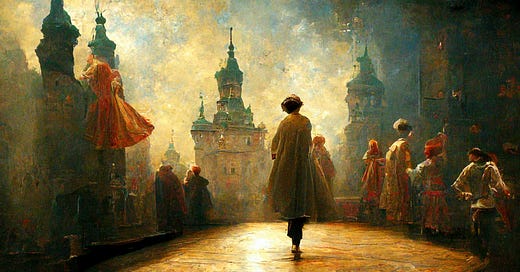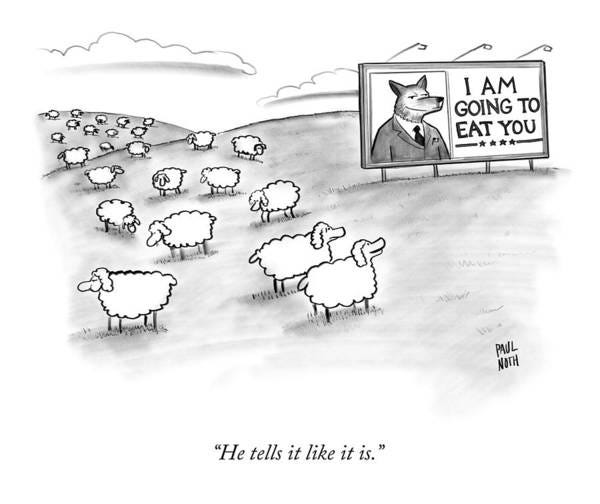This above all: to thine own self be true, And it must follow, as the night the day, Thou canst not then be false to any man.
Everyone loves someone authentic. When we travel we want to have authentic experiences, not those cookie cutter anodyne luxury resorts. When we find a job, we want it to have an authentic belief in what it’s vying for. We want our bosses to be authentically interested in our wellbeing. We want our politicians to feel like they’re real people (TM), and that they’re authentic. In fact we want this so much that we’ve blithely looked past all sorts of garbage to find one that feels authentic.
We want our fiction to be more authentic. Whether that’s about more representation of the types of people we see around us, or the emotions the characters actually go through, or the fact that the blue aliens living in a parallel universe behave in a fashion that feels all too real.
In businesses, consumer trust is low, and people trust others that talk about values over just products. In movies, it’s about introducing diversity in casting and settings and stories. Black Panther is deemed authentic and worthy of celebration because even though its a fake story in a fake country, the depiction of the continent is aspirational in a way that people would find real.
Wakanda's attire was inspired by native clothing and art from various regions throughout Africa.
Peter Jackson, supposedly given just 266 days to put together the Hobbit trilogy, said he was winging it on set.
Washed-out, clean and inexplicably ‘golden’ the Hobbit trilogy lacked the authenticity of the original trilogy, relying on CGI as opposed to elaborate set design and meticulously designed characters.
And speaking of overproduction, the new series that Amazon is making in the same universe had the same complaint against it.
the overwhelming consensus refers to a “smell of overproduction,” with many highlighting the “really clean, perfect, and bright” aesthetic that misses “the ‘dirt’ that was so characteristic in the LOTR movies”
Fans just don’t like any aesthetic that seems inauthentic. As the article says, it’s also about Boba Fett airbrushing Tatooine, disregarding the grit and dirt that feels authentic. Mad Max made its name because it felt real, authentic, rather than airbrushed videogame-esque perfection.
Even in music, this is a constant debate. Are the artists less authentic today because they rely on cheap beats and overproduced lyrics to get big? Is this different/ good/ bad?
There are, of course, still authentic artists and it's easy to understand why the rise to the top. Artists like Adele, Hudson Mohawke, Young Thug. They're trend setters who are unaffected by what's popular. I have faith that authenticity will always cut through the din that is that is the current musical landscape and with discovery becoming more and more difficult (because the sheer amount of material to sort through), I predict authenticity will become more important as we finish out the decade.
Or a particularly poignant one.
If an artist lives their lyrics, does it help to immerse you more in their worldview? do songs hit much harder if it's coming from a real perspective instead of a fictional one? For example, when listening to Alice in Chains 90's output, Layne Staley's lyrics hit much harder for me with the knowledge that he was really going through a terrible addiction, and knowing how it ended for him makes those songs 1000x more depressing (and meaningful too, I suppose)
All the world's a stage, and all the men and women merely players: they have their exits and their entrances;
Shakespeare had used it to mean we were assigned roles by God, to play just as actors play roles. We've reversed it now, we play roles for each other. Instead of the centralised mode of an imaginary God being the audience now we now play that part for each other.
Jacques, when he says it, is melancholy, pessimistic, contemplative and spends his time thinking of big important things about the world. He was exiled and lives in the forest of Arden. His entire character arc is one of being a wry commenter on what's going on around him, very much a redditor come to life. From William Hazlitt's musings.
Jaques is the only purely contemplative character in Shakespeare. He thinks, and does nothing. His whole occupation is to amuse his mind, and he is totally regardless of his body and his fortunes. He is the prince of philosophical idlers; his only passion is thought; he sets no value upon anything, but as it serves as food for reflection. He can "suck melancholy out of a song, as a weasel sucks eggs";
Whether you take Jacques seriously or not, and whether or not he was an idle wannabe philosopher, his musings on how we play different roles at different stages in our life rings true.
Shakespeare did this elsewhere too by the way. Hamlet says something equivalent. So does Antonio in merchant of venice. Not to mention the idea that we're players on a grand stage has been said before by Pythagoras, ages of man as said by Aristotle and generally prevalent in most accounts of philosophical or theological musings.
Feels like there’s a trend here.
There's a key point that our actions do fundamentally change in some ways when we think someone's watching us. David Elkind, a child psychologist of high repute (repute as a psychologist I mean, not as a child), coined the term Imaginary Audience in 1967. He coined it to point to a belief that we are under constant observation by peers.
Like when you think the things you've done play a much larger role in others' imaginations than you yourself do!
Now the theory in this space mostly concerns itself with the fact that who you think your audience is and who your audience actually is are often different.
When we behave as if for larger swathes of audiences, we tend to modulate our opinions according to who we think we're talking to. And it’s the same of convincing yourself that the real audience you're speaking to is akin to an imaginary one. Our representation of who we are forms a larger component of the speech than the information contained within.
When someone is watching you, you may change your behaviour in various ways: this is called the ‘audience effect’. Social behaviours such as acting prosocially or changing gaze patterns may be used as signals of reputation and thus may be particularly prone to audience effects.
You're no longer just professing an opinion, you're being the type of person who would profess such an opinion.
Nobody would act like that unless they knew there was an audience watching them.
Thing is, when you know someone's watching, you change your actions. God, famously, plays this part in some corners of theological analyses of ethical behaviour. But it’s not just God.
Performative behaviour means we do things purely because the audience is front of mind. Like engagement farming, or posting for the likes.
But its not just online. In the modern organisation we've taken it as an article of faith almost that people work harder when we know someone's watching. Here's HBR taking some pre-existing beliefs and packaging it up.
Social psychologists have known for decades that people are motivated to work harder when others are watching. When they are observed, people run faster, are more creative, and think harder about problems.
Parenthetically, this feels also why managers have been mostly desperate to get people back into offices and under their watchful eyes. But never fear, the authors tell us, it's not necessary that physical proximity is needed.
A camera recording people was similarly as effective as an actual human observer.
Gulp. Anyway. It’s not just the effect of being observed or being an observer. There are aspects of our life that have become entirely about playing for an audience one hopes will be there one day. There's a great Verge article that talks about the soulcrushing feeling when streaming Twitch videos for years without an audience. And there is hope at the end of that tunnel. There are tricks on how to be better at this chosen vocation.
“Think of it like you’re taping a talk show and you’re the host,” Redditor Neon_Nazgul wrote in a thread offering advice to frustrated streamers. “Sometimes there’s a studio audience, and sometimes you’re shooting something the audience will watch later.”
As you will note, the key is to have an imaginary audience to whom you speak, in the hope that the imaginary becomes real.
Modern social media is of course filled with imaginary audiences, except now some of them clap back. The imaginary there becomes real.
The very act of communication serves not only as a conduit to move information along, but much richer metadata in the types of information it conveys. With increasing performativeness across most of our conversations, we're becoming actors and performers.
So: we have a desperate need for more authenticity these days. At the same time as performative measures are increasing in number.
And I think they’re related.
As we’ve gotten more and more interconnected, we’re all ever present in front of each other. Everything we do has become performative. And even as this reality has seeped into the public consciousness, we perhaps overreacted by focusing so heavily on authenticity as the way out. In a nice twist of irony, authenticity has turned into a brand.
In a world where everyone’s acting, what wouldn’t we give for someone who’s seen to be true!








Damn this article hit me at the right time. I just finished doing an hour and a half long stream and hours of post stream work. My wife saw all the work I had put into it and was concerned. She was worried I was doing all this work to make something that few if any would ever see. I told her I was building experience and surface area for my online presence to help her understand. But in my mind, I knew I had performed for an imaginary audience that mostly didn't exist, like all good streamers do. Doing my best to bring my true self to viewers.
Authenticity as a brand has become more widespread in recent years, but do we really want it? There are several environments like politics or in the military where being too real is a road to ruin. True authenticity takes time to reveal and to appreciate, I'd argue most aren't willing to take the time.
So that leaves us with what you've said a world where the masks of technology are sold and offered at every corner. A society where no one really knows anyone or trusts anyone, I see some of that playing out now. But I also see small groups and communities taking the time to nurture true authenticity facilitated by technology. It's harder to find on the stage of life, but so valuable when I do.